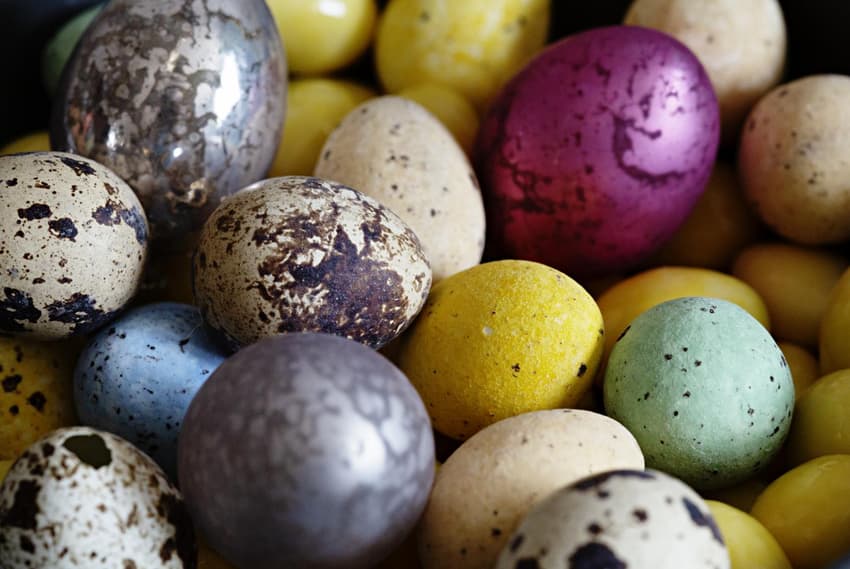Why do Swedes celebrate holidays a day early?

Sweden is getting ready to celebrate Easter this weekend, although Swedes will be tucking into eggs and herring on Saturday, rather than celebrating on Sunday as Christians do elsewhere. But why is this?
After enough time in Sweden, you’ll no doubt have noticed that almost all Swedish holidays end in afton. Midsommarafton, julafton, påskafton, even Valborgsmässoafton. Although the Swedish word kväll is more commonly used to refer to an evening, afton is an outdated term that has hung on in compound words like the names of public holidays - its original meaning of ‘evening’ still exists in Danish and Norwegian as aften.
This is usually reflected in the English translations for holidays, too: Christmas is celebrated on Christmas Eve and Midsummer on Midsummer’s Eve.
When it comes to Easter, most Christian countries celebrate on Easter Sunday, the day when Jesus is believed by Christians to have risen from the dead. Swedes, however, celebrate the day before on Holy Saturday, with Easter services in the Swedish church often taking place in the evening.
These evening services may provide a clue to why Swedes celebrate all holidays the evening before the big day, along with, somewhat unexpectedly, the Hávamál, an Old Norse poem from the Viking age, believed to be written in Norway around the 9th and 10th centuries.
The Hávamál covers topics like advice on how to live and behave, as well as wisdom, myths about Odin’s life and the creation of the world, and even how Odin supposedly acquired the magic power of the Old Norse runes.
“Praise day at evening”, the opening line of the Maxims for All Men section of the poem reads. This is due to the fact that when it was written, hundreds of years ago, before there was any way of knowing what the time actually was, a day was considered to start at nightfall. This meant that festive occasions began as soon as night fell the day before, rather than at dawn the next day.
This tradition, at least where holidays are concerned, has continued into modern times, although somewhere along the way Swedes started to celebrate throughout the day on the eve of a big holiday, rather than waiting until nightfall for the festivities to begin.
Hopefully the surprising link to the Vikings will give you some food for thought next time you're tucking in to pickled herring at Easter, Christmas or Midsummer in Sweden.
Comments
See Also
After enough time in Sweden, you’ll no doubt have noticed that almost all Swedish holidays end in afton. Midsommarafton, julafton, påskafton, even Valborgsmässoafton. Although the Swedish word kväll is more commonly used to refer to an evening, afton is an outdated term that has hung on in compound words like the names of public holidays - its original meaning of ‘evening’ still exists in Danish and Norwegian as aften.
This is usually reflected in the English translations for holidays, too: Christmas is celebrated on Christmas Eve and Midsummer on Midsummer’s Eve.
When it comes to Easter, most Christian countries celebrate on Easter Sunday, the day when Jesus is believed by Christians to have risen from the dead. Swedes, however, celebrate the day before on Holy Saturday, with Easter services in the Swedish church often taking place in the evening.
These evening services may provide a clue to why Swedes celebrate all holidays the evening before the big day, along with, somewhat unexpectedly, the Hávamál, an Old Norse poem from the Viking age, believed to be written in Norway around the 9th and 10th centuries.
The Hávamál covers topics like advice on how to live and behave, as well as wisdom, myths about Odin’s life and the creation of the world, and even how Odin supposedly acquired the magic power of the Old Norse runes.
“Praise day at evening”, the opening line of the Maxims for All Men section of the poem reads. This is due to the fact that when it was written, hundreds of years ago, before there was any way of knowing what the time actually was, a day was considered to start at nightfall. This meant that festive occasions began as soon as night fell the day before, rather than at dawn the next day.
This tradition, at least where holidays are concerned, has continued into modern times, although somewhere along the way Swedes started to celebrate throughout the day on the eve of a big holiday, rather than waiting until nightfall for the festivities to begin.
Hopefully the surprising link to the Vikings will give you some food for thought next time you're tucking in to pickled herring at Easter, Christmas or Midsummer in Sweden.
Join the conversation in our comments section below. Share your own views and experience and if you have a question or suggestion for our journalists then email us at [email protected].
Please keep comments civil, constructive and on topic – and make sure to read our terms of use before getting involved.
Please log in here to leave a comment.